

Apple Denying Apps that Access UDIDs. AntiSec claims FBI spies on Apple customers. Apple's 'spy planes' raise privacy concerns. Apple iPhone App "Siri" Privacy Concerns. Application # 2010/0207721. SYSTEMS AND METHODS FOR IDENTIFYING UNAUTHORIZED USERS OF AN ELECTRONIC DEVICE - Patents.com. Abstract This is generally directed to identifying unauthorized users of an electronic device.
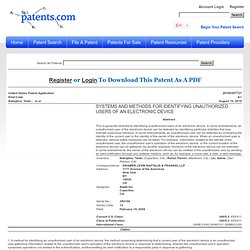
In some embodiments, an unauthorized user of the electronic device can be detected by identifying particular activities that may indicate suspicious behavior. In some embodiments, an unauthorized user can be detected by comparing the identity of the current user to the identity of the owner of the electronic device. When an unauthorized user is detected, various safety measures can be taken. For example, information related to the identity of the unauthorized user, the unauthorized user's operation of the electronic device, or the current location of the electronic device can be gathered. Claims 1. 2. 3. 4. 5. 6. Apple wants to turn off iPhone cameras.
Published time: June 16, 2011 19:16 Edited time: June 16, 2011 23:31.
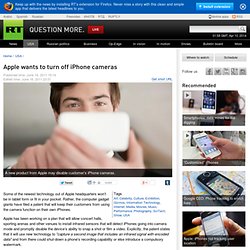
Apple Patent Aims to Shut Down iPhone Camera Recording in Venues. Your iPhone is there when you need it: whether you're lost and looking up directions, trying to find a nearby restaurant, or just want to film your favorite band performing in concert.
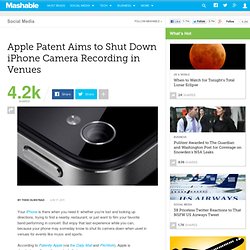
But enjoy that last experience while you can, because your phone may someday know to shut its camera down when used in venues for events like music and sports. According to Patently Apple (via the Daily Mail and Pitchfork), Apple is developing software for precisely that. The software would recognize when the iPhone’s camera was in use. Infra-red sensors installed at the venue would activate the software and disable the camera. Richard Dreyfuss reads the iTunes EULA. Update 4:17 p.m.
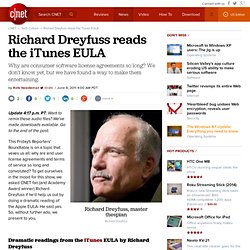
Apple patents mobile camera that other people can shut off. An Apple patent describes a system for allowing venue owners to override compliant cameras.

The patent describes using an infrared signal that compliant cameras would detect; in the presence of this signal, the device would not allow its owner to activate its record function. It is intended for use at live events and galleries and museums, and it will be a tremendous boon to policemen who shoot unarmed subway riders, despotic armies putting down revolutions as well as anyone else who is breaking the law or exercising coercive power. This is part of an increasing trend to designing hardware and software that allows remote parties to override the instructions of the owners and users of devices. This trend, coupled with the increasing degree to which devices are privy to our secrets, our sensitive information, and even our biological functions, worries me an awful lot. Disastrous Implications of New Apple Patent for Blocking Cellphone Video - storify.com. Got an iPhone or 3G iPad? Apple is recording your moves. Update, 4/27/11 — Apple has posted a response to questions raised in this report and others.
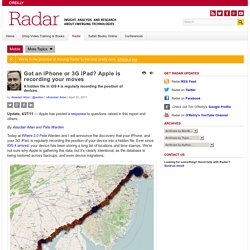
By Alasdair Allan and Pete Warden Today at Where 2.0 Pete Warden and I will announce the discovery that your iPhone, and your 3G iPad, is regularly recording the position of your device into a hidden file. Ever since iOS 4 arrived, your device has been storing a long list of locations and time stamps. We’re not sure why Apple is gathering this data, but it’s clearly intentional, as the database is being restored across backups, and even device migrations. A visualization of iPhone location data. The presence of this data on your iPhone, your iPad, and your backups has security and privacy implications. iPhone keeps record of everywhere you go. Security researchers have discovered that Apple's iPhone keeps track of where you go – and saves every detail of it to a secret file on the device which is then copied to the owner's computer when the two are synchronised.
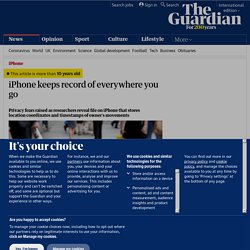
The file contains the latitude and longitude of the phone's recorded coordinates along with a timestamp, meaning that anyone who stole the phone or the computer could discover details about the owner's movements using a simple program. For some phones, there could be almost a year's worth of data stored, as the recording of data seems to have started with Apple's iOS 4 update to the phone's operating system, released in June 2010.
"Apple has made it possible for almost anybody – a jealous spouse, a private detective – with access to your phone or computer to get detailed information about where you've been," said Pete Warden, one of the researchers. Simon Davies, director of the pressure group Privacy International, said: "This is a worrying discovery. Apple Patent Reveals Extensive Stalking Plans. Regarding this article: Gizmodo's sensationalism must be working, because I'm commenting.
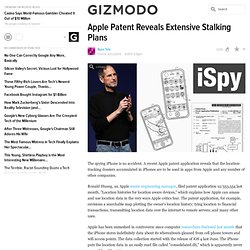
Let's stop and think for a moment. Apple files a ton of patents, many of which never ACTUALLY become real products or features. Anyone assuming that this is related to the tracking data is falling prey to the confirmation trap. That this patent exists is likely unrelated to the database stored on phones. Regarding the issue in general: It is important to differentiate between your iPhone collecting this data and Apple collecting this data.
I also find it difficult to listen to people complain about their movements being tracked when many smartphone users participate in Facebook Places, Google Latitude, Foursquare and Go-Walla. That being said, I'm a strong proponent of privacy, and I simply advise everyone to encrypt their backups and password lock their phones. Your life stopped being private the moment you started carrying around a cell phone. Apple patent app shows plans for location data - smartphones, security, privacy, Phones, consumer electronics, Apple. A recently published Apple patent application indicates the company may have plans to collect iPhone user location history but it's not clear if the patent application is related to the recent discovery that iPhones and iPads store historical location information.
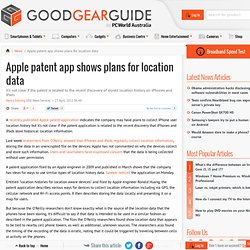
Last week researchers from O'Reilly showed that iPhones and iPads regularly collect location information, storing the data in an unencrypted file on the devices. Apple has not commented on why the devices collect and store such information. SIRI : Apple se lance t-il dans le fichage biométrique de masse ? Un utilisateur vient de transmettre sur une liste de diffusion une capture d’écran qui donne franchement à réfléchir.
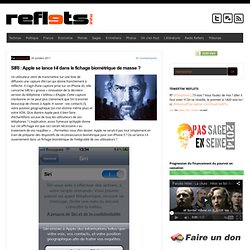
Il s’agit d’une capture prise sur un iPhone 4S, elle concerne SIRI la « grosse » innovation de la dernière version du téléphone « kifétou » d’Apple. Cette capture mentionne on ne peut plus clairement que Siri transmet beaucoup de choses à Apple. A savoir : vos contacts (!) , votre position géographique (on s’en étonne même plus) et votre VOIX.